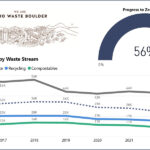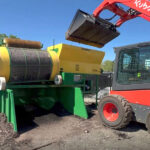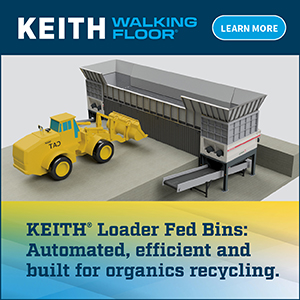What began with a contract to compost leaves from the City of Charlottesville, Virginia has evolved into a sustainable soil amendment products company.
Ryan Cooper
BioCycle October 2014
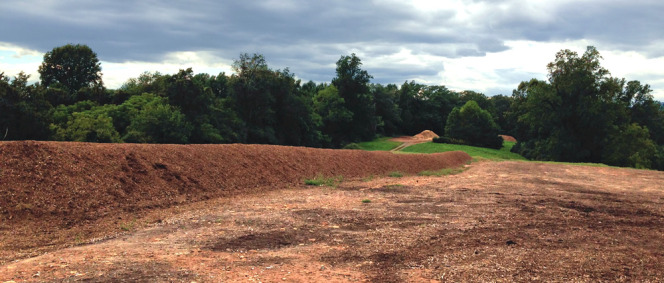
Panorama Pay-Dirt processes fall leaves, wood chips and some poultry litter in windrows on roughly 20 acres of gently rolling hills. Photo by Ryan Cooper
In the mid-1990s, brothers Steve and Drew Murray were seeking options to keep the 830-acre family farm in Earlysville, Virginia from “growing houses.” Opportunely, pressure was building on the City of Charlottesville to change the way it was managing fall leaf litter. The Murrays responded to a request for proposals seeking an able party to compost all of the municipality’s leaves. The brothers won that contract, and started their company, Panorama Pay-Dirt.
They received a permit exemption from the Virginia Department of Environmental Quality (DEQ) in 1998, which allows Panorama Pay-Dirt to compost yard trimmings that are less than 6 inches in diameter. The business is required to inform the DEQ about the quantities and materials it receives if a total of more than 6,000 cubic yards (cy) are accepted. Steve Murray recalls the company’s first 10-year contract with the city, when Panorama was paid an estimated $10,000/year for taking all of the municipality’s leaves. The material became so valuable as a feedstock for his product that the Murrays now accept the waste for free under a one-year contract (with three one-year renewals if all parties are satisfied).
Today, Charlottesville’s leaves only make up 30 to 40 percent of the material composted. The remainder comes from private contractors. Overall, Panorama Pay-Dirt receives an estimated 17,500 cubic yards (3,500 tons)/year of leaves, 1,000 cubic yards of wood chips and 2,000 cubic yards of landscaping waste each year. Poultry and turkey litter also are accepted. Starting around November 10th, roughly 75 loads of leaves arrive per day. A total of five full-time and three part-time employees include brothers Steve and Drew, Steve’s wife, Merrick, and his brother-in-law.
Composting Process
Panorama Pay-Dirt composts using windrows on roughly 20 acres of gently rolling hills. In addition to compost made from leaves, the company also produces a composted mulch made from arborists’ wood chips. Leaves are preferred as the compost feedstock because they break down so much more quickly. Windrows for both compost and composted mulch are located in three separate areas within the 20-acre site.
Local tree care companies drop loads of wood chips on a large gravel pad down the hill from the windrows. These chips are formed into windrows with a loader and then poultry manure is added on top and incorporated immediately to make the composted mulch product. As loads of leaves come in during the fall, the municipality and local contractors are directed to dump directly on or near the compost windrows to make their formation easier. Turkey manure is added to the leaf windrows and turned right away to minimize odor. A centrally located 2-acre rock dust pad is used mainly for equipment storage and for materials receiving during inclement weather. Compost screening takes place in a designated location apart from the windrows. The yard waste is received and ground on the opposite side of the site from the wood chip reception area. It is processed in a tub grinder and the product is sold as double ground hardwood mulch.
Stormwater runoff is captured in several ponds downhill from the windrows (ranging from one-tenth of an acre to 5 acres in size). Water is drawn principally from the smallest pond, and applied using 1,500-gallon water tanks on trailers, in order to optimize moisture in the piles.
Panorama Pay-Dirt has a Duratech S-10 windrow turner, which the operators appreciate for its ability to work well on uneven terrain. Compost is managed in active piles for about 120 days and cures for an average of 60 days. Depending on the winter weather, compost is usually ready for sale in March.
A Rawson 3624 screener reduces particle size of the finished compost to less than three-quarters of an inch. The biggest challenge the facility faces is contamination — roughly 1 to 2 percent of foreign material comes in with the feedstocks. Residents can use plastic bags to set out leaves, but the municipality and contractors are directed to debag when they drop off leaves. Most of the contamination is from trash within the leaves, e.g. plastic bottles and film from wrappers, etc. Panorama screens the overs piles after they cure for one year and recover 75 to 80 percent of the material as salable compost. Although the facility’s composting permit does not require testing, the company regularly sends its compost product to the Penn State laboratory for analysis.
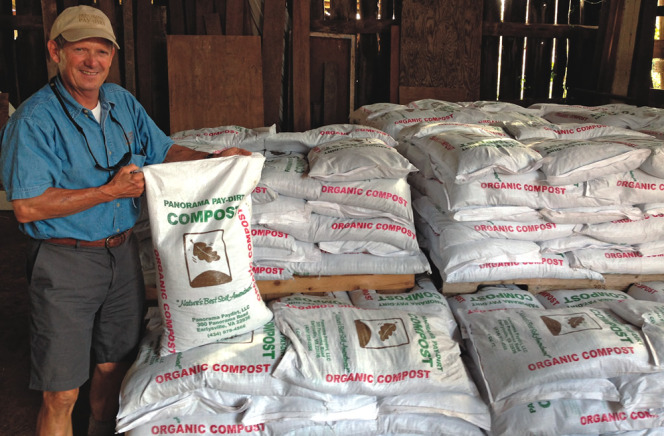
The Murrays built a bagging line that fills 6,000 one cubic yard bags of compost each year (Steve Murray shown holding a filled bag). Photo by Ryan Cooper
Product Sales
In addition to compost and the double ground mulch, a screened 60:40 topsoil/compost mix is available. Products are sold primarily in bulk, both at the site and delivered in small dump trucks. Compost and composted mulch sell for $30 and $24/cubic yard, respectively. Discount sales advertised on the website or flyers help clear stockpiled materials that might accumulate in the spring or after storms. The Murrays also make 6,000 one cubic yard bags of compost each year, representing 8 percent of the total finished product. Retail garden centers in the area carry the product for $6/bag.
Panorama Pay-Dirt is not interested in composting food waste, due in part to additional permitting requirements. The feedstocks that Panorama handles allow the business to operate on a five-day work schedule, with even more flexibility during the off-season, as opposed to the constant, time-sensitive management required to compost food waste properly. The company did participate in a pilot study to compost food waste from the University of Virginia but decided not to provide that service.
Keeping local residents happy is high on Panorama Pay-Dirt’s list of priorities. Operators go out of their way to move snow from neighborhood driveways, plow adjacent fields, deliver compost and mulch, and assure that their neighbors are content. “If I have an odor problem, then we’re not doing it right,” says Steve Murray.
In addition to Panorama Pay-Dirt, the Murray family’s Panorama Farms hosts weddings and summer camps. High school and collegiate cross-country meets, including NCAA regionals and ACC championships, can attract up to 3,000 people at a time. Leasing hunting and agricultural rights on the farm add to the financial portfolio, but after conventional farming stopped paying the bills, making compost on the property became their bread and butter. “Composting is a business of passion,” adds Murray, and keeps the farm in the family and prevents the scenic landscape from becoming another housing development.
Ryan Cooper, LEED GA, recently completed his Master of Science in Regenerative Studies at the John T. Lyle Center for Regenerative Studies, California State Polytechnic University Pomona.



